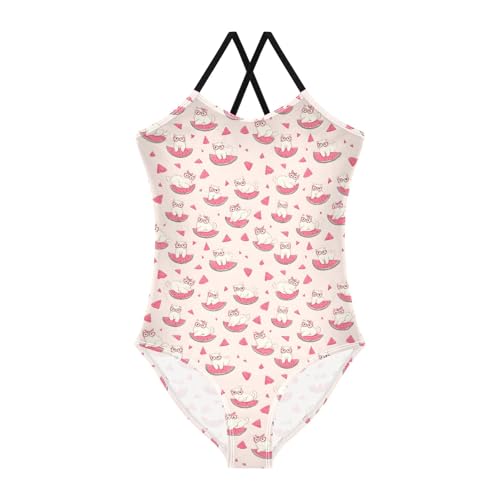The Safety of Watermelon for Cats
As a cat lover, it’s important to know what foods are safe for your furry friend. You may be wondering if cats can safely eat watermelon. After all, it’s a delicious and refreshing fruit that many of us enjoy during the summer months. But is it safe for our feline companions? Let’s find out.
Watermelon in moderation is generally safe for cats to eat. It can be a tasty and hydrating treat for them on hot days. However, there are a few things to keep in mind to ensure your cat’s safety:
- Remove the seeds and rind: Cats should only consume the juicy red flesh of the watermelon. The seeds and rind can be difficult to digest and may cause gastrointestinal issues. It’s best to remove them before offering some to your cat.
- Keep it as a treat: While watermelon can be a refreshing snack for cats, it should not replace their regular balanced diet. Treats, including watermelon, should only make up a small portion of their overall food intake.
- Monitor for allergies or digestive issues: Just like humans, cats can have allergies or sensitivities to certain foods. If your cat experiences any adverse reactions, such as vomiting or diarrhea, after eating watermelon, it’s best to avoid giving it to them in the future.
Remember, every cat is unique, and what is safe for one may not be safe for another. If you have any concerns about feeding watermelon to your cat, it’s always a good idea to consult with your veterinarian.
While watermelon can be enjoyed by cats in moderation, it’s essential to take precautions to ensure their safety and health. As a responsible cat owner, you should always prioritize your furry friend’s well-being when considering adding new foods to their diet.
Understanding the Nutritional Value of Watermelon
Watermelon is not only a delicious summer treat for us humans, but it might also catch your cat’s attention. You may wonder if it’s safe for your furry friend to enjoy a bite or two. Let’s take a closer look at the nutritional value of watermelon for cats!
Hydration Powerhouse:
Watermelon is about 92% water. It can be a refreshing way to keep your cat hydrated, especially during hot weather. Proper hydration is crucial for your fluffy friend’s overall health and well-being.
Vitamins and Antioxidants:
Watermelon contains essential vitamins like vitamin A and vitamin C, which can support your cat’s immune system and promote healthy eyes and skin. It also boasts antioxidants that can help fight against cell damage and reduce the risk of certain diseases.
Low in Calories and Fat:
If your cat is watching its weight, watermelon can be a good option. It is low in calories and fat, making it a healthier choice compared to other treats. However, remember that moderation is key. Too much of anything, even something healthy, can upset your cat’s stomach.
Fiber Content:
Watermelon contains a good amount of dietary fiber, which can help with digestion. However, it’s important to remove the seeds and rind before offering watermelon to your cat. These parts can be difficult for cats to digest and may cause tummy troubles.
Sugar Content:
While watermelon is naturally sweet, it also contains natural sugars. Excessive sugar intake can lead to weight gain and other health issues in cats. So, remember to limit the amount of watermelon you give to your furry friend.
When it comes to treats like watermelon, it’s vital to prioritize your cat’s safety and well-being. Always offer watermelon in moderation, remove the seeds and rind, and watch out for any allergies or digestive issues. If you have any concerns, it’s best to consult with your veterinarian.
Potential Benefits of Watermelon for Cats
Watermelon isn’t just a refreshing treat for humans on a hot summer day – it can also provide some potential benefits for our feline friends. Here’s why watermelon can be a healthy addition to your cat’s diet:
Hydration
Cats are notorious for not drinking enough water, which can lead to dehydration. Watermelon is about 92% water, making it an excellent source of hydration for your cats. It can help keep them cool and prevent urinary tract problems.
Vitamins and Antioxidants
Watermelon contains vitamins A and C, as well as antioxidants like lycopene, which are essential for a cat’s overall well-being. These nutrients can support their immune system, promote healthy eyes, and maintain a shiny coat.
Low in Calories and Fat
Unlike other treats, watermelon is low in calories and fat, making it a healthier option. It can be a guilt-free snack for your cat without worrying about them gaining excessive weight.
Fiber
Watermelon is also a good source of dietary fiber. Fiber plays a key role in maintaining a healthy digestive system for cats. It can promote regular bowel movements and prevent constipation.
Remember!
While watermelon can provide some benefits for your cat, it’s important to remember a few things:
- Remove the seeds and rind. The seeds can be a choking hazard, and the rind is difficult for cats to digest.
- Moderation is key. Too much watermelon can lead to digestive issues and an upset stomach.
- Watch the sugar intake. Although watermelon is relatively low in sugar, it’s still important to limit the amount your cat consumes.
If you have any concerns or questions about feeding your cat watermelon, it’s always a good idea to consult with your veterinarian. They can provide personalized recommendations based on your cat’s specific needs.
Keep your furry friend’s health and safety in mind when offering them watermelon as a treat. Remember, it’s important to prioritize their well-being above all else.
| Benefits of Watermelon for Cats |
|---|
| Hydration |
| Vitamins and Antioxidants |
| Low in Calories and Fat |
| Fiber |
Risks and Concerns of Feeding Watermelon to Cats
Feeding watermelon to your cat can be a tasty and refreshing treat. However, there are some risks and concerns to consider before offering it to your feline friend.
- Choking Hazard: Cats are prone to swallowing things they shouldn’t, especially small objects. The seeds and rind of watermelon can pose a choking hazard for your cat. To ensure their safety, it’s crucial to remove all seeds and the outer rind before giving them any watermelon.
- Digestive Issues: While watermelon is generally considered safe for cats, it can still cause digestive issues if consumed in large quantities. Like humans, cats have different sensitivities to food, and excessive watermelon intake can lead to an upset stomach, diarrhea, or even dehydration. Moderation is key to avoid any potential problems.
- Sugar Content: While watermelon is relatively low in sugar compared to other fruits, it’s still important to be mindful of your cat’s sugar intake. Cats are obligate carnivores, which means their bodies are designed to metabolize protein, not sugar. Too much sugar in their diet can lead to weight gain, dental issues, and even diabetes. Be sure to offer watermelon as an occasional treat and not a regular part of their diet.
- Allergies: Just like humans, cats can have allergies too. Although watermelon is not a common allergen for cats, it’s always possible for them to develop an adverse reaction. Look out for any signs of allergic reactions like itching, vomiting, or diarrhea. If you notice any of these symptoms, it’s best to consult your veterinarian.
- Veterinary Guidance: Every cat is unique, and it’s essential to prioritize their health and safety above all else. If you have any specific concerns or questions about feeding watermelon to your cat, it’s always best to consult with your veterinarian. They can provide personalized advice based on your cat’s individual needs and health conditions.
Remember, while cats can enjoy some watermelon as a treat, it should never replace a well-balanced diet formulated specifically for cats. Be cautious, know your cat’s preferences and limitations, and make their well-being your top priority.
How to Safely Introduce Watermelon to Your Cat
If you’re a cat lover like me, you may be wondering if it’s safe for your feline friend to enjoy some watermelon. The good news is that in moderation, watermelon can be a safe and refreshing treat for your cat. Here are a few important tips to keep in mind when introducing watermelon to your furry companion:
- Start with small portions: Begin by offering your cat a small amount of watermelon to see how they react. Some cats may love the taste, while others may not be interested. It’s all about finding what your cat enjoys!
- Remove the seeds and rind: Before feeding watermelon to your cat, make sure to remove all the seeds and the tough outer rind. Seeds can pose a choking hazard, and the rind is difficult for cats to digest.
- Dice it into small pieces: Cats have small mouths and it’s important to make the watermelon bite-sized for them. Dice the watermelon into small, manageable pieces to avoid any potential choking hazards.
- Watch for digestive issues: While most cats can tolerate watermelon, some may experience digestive issues. Keep an eye out for any signs of discomfort, such as vomiting or diarrhea. If you notice any negative reactions, it’s best to avoid giving your cat watermelon in the future.
Remember, watermelon should always be given as a treat and not a staple in your cat’s diet. Although watermelon is hydrating and contains vitamins and antioxidants, it shouldn’t replace a well-balanced cat food. Consult with your veterinarian before introducing any new foods to your cat.
Conclusion
Now you know that cats can indeed eat watermelon, but it’s important to introduce it safely and in moderation. Remember to start with small portions, remove the seeds and rind, and dice the watermelon into small pieces for easy digestion. Keep an eye out for any digestive issues and consult with your veterinarian if you have any concerns.
While watermelon can be a refreshing and tasty treat for your feline friend, it should never replace a well-balanced cat diet. It’s important to provide your cat with a nutritionally complete and balanced cat food that meets their specific dietary needs.
So go ahead and treat your cat to a small piece of watermelon every now and then, but always remember to prioritize their overall health and well-being. With a little caution and moderation, you can safely share the joy of watermelon with your furry companion.
Frequently Asked Questions
Can cats eat watermelon?
Yes, cats can eat watermelon, but it should be given in moderation as an occasional treat.
Is it safe for cats to eat watermelon seeds?
No, it is not safe for cats to eat watermelon seeds. The seeds can cause digestive issues or intestinal blockage in cats.
Should I remove the rind before giving watermelon to my cat?
Yes, you should remove the rind before giving watermelon to your cat. The rind is difficult for cats to digest and can cause stomach upset.
How should I prepare watermelon for my cat?
Dice the watermelon into small, cat-sized pieces and remove any seeds or rind.
Can introducing watermelon cause digestive issues in cats?
Yes, introducing watermelon can cause digestive issues in cats. Monitor your cat for any signs of stomach upset or diarrhea and consult with a veterinarian if necessary.
Can I replace my cat’s diet with watermelon?
No, watermelon should not replace a well-balanced cat diet. It should only be given as an occasional treat.













